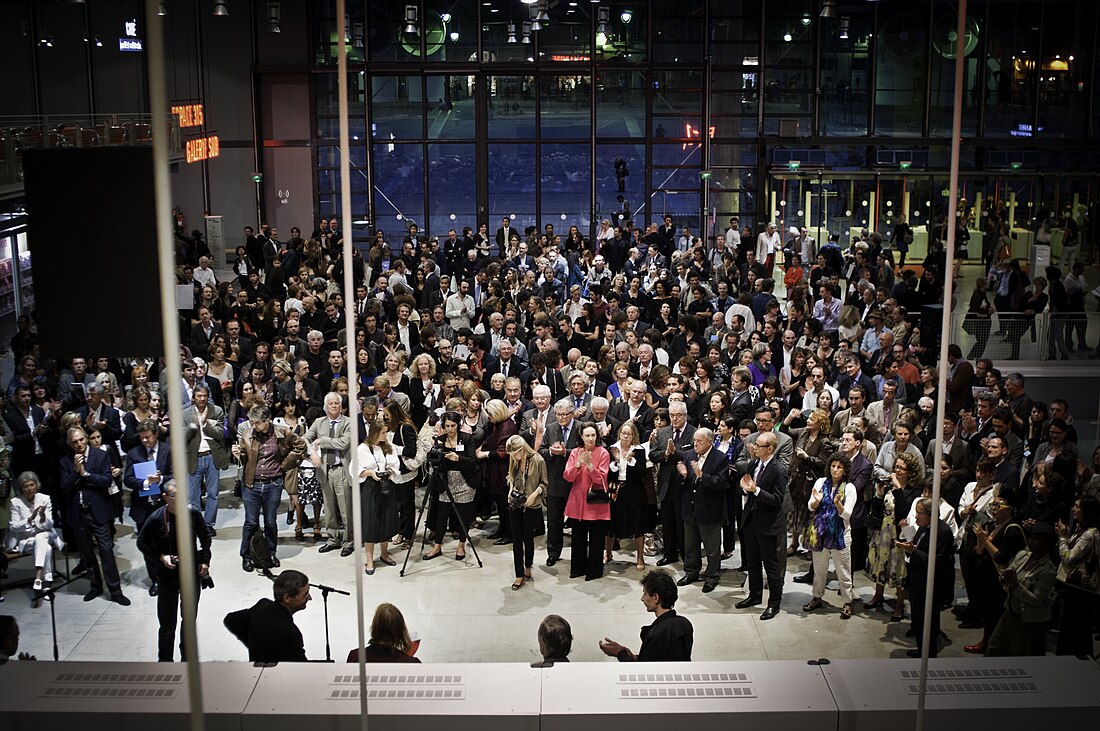The Marcel Duchamp Prize (in French : Prix Marcel Duchamp) is an annual award given to a young artist by the Association pour la Diffusion Internationale de l'Art Français (ADIAF).[1]


The winner receives €35,000 personally and up to €30,000 in order to produce an exhibition of their work in the Modern Art museum (Centre Georges Pompidou).
The prize is named after the artist Marcel Duchamp.
History of the Marcel-Duchamp Prize
In the early 1990s, an association was created, the ADIAF (Association for the international dissemination of French art), notably by Gilles Fuchs, international lawyer but also art collector, and by the gallery owner Daniel Templon, to participate in better promotion and distribution of the works of French visual artists. Launched by a group of five people, the ADIAF has nearly 400 members in 2020. You become a member by cooptation: you have to be a collector (but this criterion includes exceptions, in particular some gallery owners, brokers and art restorers) and be interested in the French art scene.[2]
Prize winners
| Year | Winner | Other nominees |
|---|---|---|
| 2001 | Thomas Hirschhorn | Pierre Bismuth, Rebecca Bournigault, Claude Closky, Felice Varini, Xavier Veilhan |
| 2002 | Dominique Gonzalez-Foerster[3] | Anri Sala, Bernard Frize, Valérie Jouve, Wang Du |
| 2003 | Mathieu Mercier | Stéphane Couturier, Claude Lévêque, Pascal Pinaud, Eric Poitevin |
| 2004 | Carole Benzaken | Valérie Belin, Philippe Cognée, Richard Fauguet, Philippe Ramette |
| 2005 | Claude Closky[4] | Kader Attia, Gilles Barbier, Olivier Blanckart |
| 2006 | Philippe Mayaux | Abdel Abdessemed, Leandro Erlich, Bruno Peinado |
| 2007 | Tatiana Trouvé | Adam Adach, Pierre Ardouvin, Richard Fauguet |
| 2008 | Laurent Grasso | Michel Blazy, Stéphane Calais, Didier Marcel |
| 2009 | Saâdane Afif | Damien Deroubaix, Nicolas Moulin, Philippe Perrot |
| 2010 | Cyprien Gaillard | Céleste Boursier-Mougenot, Camille Henrot, Anne-Marie Schneider |
| 2011 | Mircea Cantor | Damien Cabanes, Guillaume Leblon, Samuel Rousseau |
| 2012 | Daniel Dewar et Grégory Gicquel- sculpture | Valérie Favre, Bertrand Lamarche, Franck Scurti |
| 2013 | Latifa Echakhch | Farah Atassi, Claire Fontaine, Raphaël Zarka |
| 2014 | Julien Prévieux[5] | Evariste Richer, Théo Mercier, Florian et Michaël Quistrebert |
| 2015 | Melik Ohanian | Davide Balula, Neïl Beloufa, Zineb Sedira |
| 2016 | Kader Attia[6][7] | Yto Barrada, Ulla von Brandenburg, Barthélémy Toguo |
| 2017 | Joana Hadjithomas and Khalil Joreige[8] | Maja Bajevic, Charlotte Moth, Vittorio Santoro |
| 2018 | Clément Cogitore[9][10] | Mohamed Bourouissa, Thu Van Tran, Marie Voignier |
| 2019 | Éric Baudelaire[11] | Katinka Bock, Marguerite Humeau, Ida Tursic & Wilfried Mille |
| 2020 | Kapwani Kiwanga[12] | Alice Anderson, Hicham Berrada, Enrique Ramirez |
| 2021 | Lili Reynaud-Dewar[13] | Isabelle Cornaro, Julian Charrière, Julien Creuzet |
| 2022 | Mimosa Echard[14] | Giulia Andreani, Iván Argote, Philippe Decrauzat |
| 2023 | Tarik Kiswanson[15] | Bertille Bak, Bouchra Khalili, Massinissa Selmani |
See also
References
External links
Wikiwand in your browser!
Seamless Wikipedia browsing. On steroids.
Every time you click a link to Wikipedia, Wiktionary or Wikiquote in your browser's search results, it will show the modern Wikiwand interface.
Wikiwand extension is a five stars, simple, with minimum permission required to keep your browsing private, safe and transparent.
